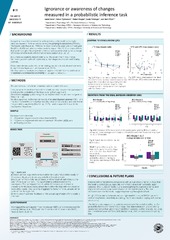Blar i forfatter "Tjelmeland, Håkon"
-
Ignorance or awareness of changes measured in a probabilistic inference task
Kreis, Isabel Viola; Tjelmeland, Håkon; Biegler, Robert; Tröbinger, Luzia Rosa; Pfuhl, Gerit (Conference object; Konferansebidrag, 2017)A cognitive bias often reported for schizophrenia is the tendency to make decisions based on little evidence, namely the jumping to conclusions (JTC) bias. The beads task (Huq et al., 1988) is the most commonly used task to investigate the JTC and different attempts were made to explain the JTC. One proposition is that patients might miscomprehend the task and assume volatility, i.e. a change of ... -
Overestimation of volatility in schizophrenia and autism? A comparative study using a probabilistic reasoning task
Kreis, Isabel Viola; Biegler, Robert; Tjelmeland, Håkon; Mittner, Matthias; Reitan, Solveig Merete Klæbo; Pfuhl, Gerit (Journal article; Tidsskriftartikkel; Peer reviewed, 2021-01-07)<i>Background and objectives</i> - A plethora of studies has investigated and compared social cognition in autism and schizophrenia ever since both conditions were first described in conjunction more than a century ago. Recent computational theories have proposed similar mechanistic explanations for various symptoms beyond social cognition. They are grounded in the idea of a general misestimation ... -
Probabilistic inference in psychosis and autism
Kreis, Isabel Viola; Sandvik, Kristin; Tjelmeland, Håkon; Biegler, Robert; Pfuhl, Gerit (Conference object; Konferansebidrag, 2017)Within the predictive coding framework the brain is defined as an inference machine that continuously tries to predict its sensory inputs on the basis of beliefs about the world and updates those beliefs in the presence of contradictory sensory data (i.e. prediciton errors; Friston, 2005). Neurobiologically, the weighting and further processing of those prediction errors is thought to be influenced ... -
Psychosis and Psychotic-Like Symptoms Affect Cognitive Abilities but Not Motivation in a Foraging Task
ten Velden Hegelstad, Wenche; Kreis, Isabel Viola; Tjelmeland, Håkon; Pfuhl, Gerit (Journal article; Tidsskriftartikkel; Peer reviewed, 2020-07-31)<i>Background and Objective</i>: Goal-directed behavior is a central feature of human functioning. It requires goal appraisal and implicit cost-benefit analyses, i.e., how much effort to invest in the pursuit of a certain goal, against its value and a confidence judgment regarding the chance of attainment. Persons with severe mental illness such as psychosis often struggle with reaching goals. ...


 English
English norsk
norsk


